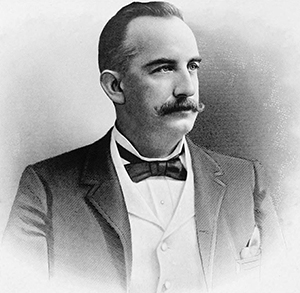Johnson, Charles Earl
13 Aug. 1851–9 Sept. 1923
 Charles Earl Johnson, businessman, was born in Raleigh, the son of Charles Earl and Frances Iredell Johnson. His mother was the daughter of James Iredell, governor of North Carolina in 1827–28. Young Johnson attended Lovejoy's Academy in Raleigh and also received instruction from the Reverend Dr. R. S. Mason. At age fourteen, he enrolled as a private in the Confederate Army shortly before the war ended. At seventeen he worked as a clerk at W. H. & R. S. Tucker, a Raleigh dry goods store, and in 1874–75 he was assistant secretary of the North Carolina Senate.
Charles Earl Johnson, businessman, was born in Raleigh, the son of Charles Earl and Frances Iredell Johnson. His mother was the daughter of James Iredell, governor of North Carolina in 1827–28. Young Johnson attended Lovejoy's Academy in Raleigh and also received instruction from the Reverend Dr. R. S. Mason. At age fourteen, he enrolled as a private in the Confederate Army shortly before the war ended. At seventeen he worked as a clerk at W. H. & R. S. Tucker, a Raleigh dry goods store, and in 1874–75 he was assistant secretary of the North Carolina Senate.
Johnson wished to study law, but the decimation of the family fortune during the Civil War and the death of his father in 1876 prevented him from doing so. Instead, he joined a large cotton firm, cotton at that time being the most important staple article in the trade of Raleigh. Within a year, he became manager of the firm of Lee, Whitaker and Johnson. In September 1877 he established his own cotton business, C. E. Johnson and Co., the first to build a cotton press in Raleigh. Johnson was also one of the first to recognize the advantage of exporting cotton directly from points of origin to the interior of the state, and direct exports by his company soon amounted to 150,000 bales annually. Later, as the consumption of cotton increased locally, Johnson's firm decreased exports. His new method of exports reduced the cost of handling cotton between producer and consumer. The company operated a large plant in Hamlet as well as in Raleigh.
In addition to his cotton business, Johnson was a longtime director of the Seaboard Air Line Railway and president of Carolina Ice Co. and Hamlet Ice Co. At the time of his death he was president of the Carolina Power & Light Co. Active in banking, he was the first president of the Mechanics Bank of Raleigh, vice-president of the National Bank of Raleigh, and president of Raleigh Banking and Trust. He also served as president of the Chesterfield Land and Lumber Co.
Although Johnson described himself as a "zealous supporter of the Democratic party," he never actively sought political office. Nevertheless, in 1905 Governor R. B. Glenn appointed him a member of his staff with the rank of colonel. Johnson also served as a member of the Raleigh city council. An Episcopalian, he was vestryman of Christ Church parish and for thirty years treasurer of the Diocese of North Carolina. He was an avid fisherman, and his tackle box was said to have been one of his most valued possessions.
On 7 Dec. 1876 Johnson married Mary Ellis Wilson of Charlotte, and they were the parents of three children: Mary Wilson (Mrs. Frank Kimbark), Charles Earl, Jr., and Fanny Hines (Mrs. Morris Harris). Johnson died of a heart attack and was buried in Oakwood Cemetery, Raleigh.
References:
Samuel A. Ashe, ed., Biographical History of North Carolina, vol. 2 (1905).
North Carolina Biography, vol. 4 (1919).
Raleigh News and Observer, 10 Sept. 1923.
Additional Resources:
"The Edenton Tea Party." North Carolina Historical and Genealogical Register 2, no. 2 (April 1901). 167. http://books.google.com/books?id=lHIxq9iDgYQC&lpg=PP1&pg=RA1-PA167#v=onepage&q&f=false (accessed January 29, 2013).
Wharton and Tyree Studios. "Photograph, Accession #: H.1952.44.7." 1880-1900. North Carolina Museum of History.
Image Credits:
E.G. Williams & Bro. "Charles Earl Johnson." Biographical history of North Carolina from colonial times to the present. Greensboro, N.C.: C. L. Van Noppen. 1905. https://archive.org/stream/cu31924092215445#page/n299/mode/2up (accessed January 29, 2013).
1 January 1988 | Wright, David C., III